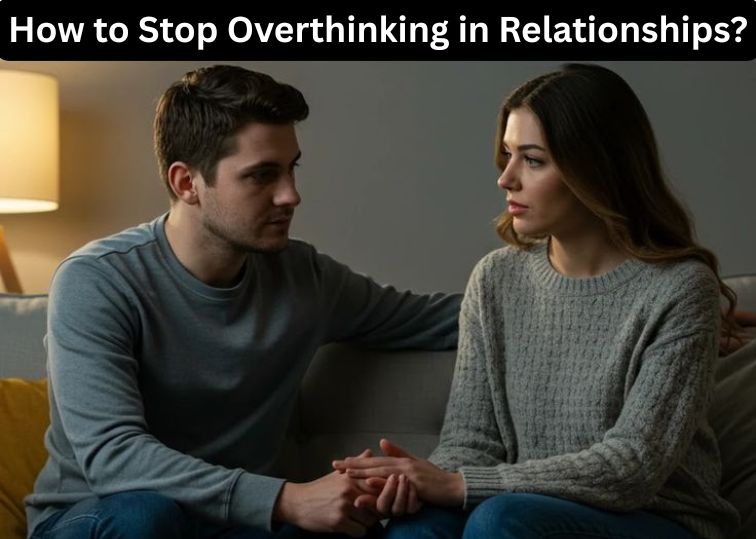Overthinking in relationships is something almost everyone does at some point. You sit there thinking, Did I say something wrong? Why haven’t they replied yet? Do they still love me? And before you know it, your mind has built a hundred stories that probably aren’t even true.
If you often find yourself stuck in these thoughts, you’re not alone. But learning how to stop overthinking in relationships can truly change the way you feel, love, and connect with people. It helps you feel calmer, more confident, and free from the stress that constant worrying brings. Let’s talk about how to do that, in a simple and real way.
Why Do We Overthink in Relationships?
Overthinking usually comes from fear, fear of losing someone, fear of not being good enough, or fear of being hurt. Maybe you’ve been through heartbreak before, or maybe you just care too much about the person. When we care deeply, we want things to go perfectly. But the truth is, no relationship is perfect. Overthinking starts when you try to control every little thing that happens, every message, every word, every feeling.
Your mind tries to “solve” problems that might not even exist. It keeps asking what if, what if they’re mad, what if they don’t love me, what if something’s wrong. And these thoughts only make you anxious and tired.
1. Notice When You Start Overthinking
The first step to stop overthinking is to notice it. Sometimes you don’t even realize when your thoughts have gone too far. Pay attention to your mind. Are you replaying a small argument again and again? Are you reading too much into their silence or a short text message?
When you catch yourself doing it, pause and say, Wait, I’m overthinking again. Just that awareness can stop your thoughts from spiraling out of control.
2. Don’t Assume
Many relationship problems don’t come from what’s actually said, they come from what we think the other person meant. Instead of guessing or assuming, just ask. Communication is the best way to calm your mind. If something is bothering you, say it gently.
For example, instead of sitting in silence thinking, They’re ignoring me, try asking, Hey, you’ve been quiet today, is everything okay? Most of the time, it’s not as bad as you think. Clear communication builds trust and keeps your thoughts from running wild.
3. Stay in the Present Moment
Overthinking pulls you out of the present. You start thinking about things that have already happened or worrying about what might happen next. But the only place you can actually fix anything is the present. When your mind starts racing, bring yourself back. Take a deep breath. Focus on what’s happening right now.
Notice the small things, how you feel, what’s around you, what’s real. You can even say to yourself, I’m here, and everything is okay right now. This simple practice can stop your brain from wandering into negative stories.
4. Stop Expecting the Worst
One reason people overthink is that they expect something bad to happen. You start preparing for heartbreak even before it happens. But constantly thinking about the worst doesn’t protect you; it just steals your peace.
Instead of thinking, They’ll leave me, remind yourself, I have no proof of that. I’ll handle things if they come, but for now, we’re fine. You can’t control everything that happens, but you can control how you think about it.
5. Focus on What You Can Control
You can’t control how someone else feels or reacts, but you can control your own emotions and behavior. If you keep focusing on what you can’t control, you’ll always feel anxious. But when you focus on what you can, like your reactions, your attitude, your peace, life feels much lighter.
When something upsets you, ask yourself, Can I do something about this right now? If the answer is yes, take action. If not, let it go and focus on something else.
6. Don’t Overanalyze Texts or Messages
This is one of the biggest triggers for overthinking. You read a message like “okay” or “sure,” and your brain goes, They’re mad at me. But maybe they’re just busy. Or tired. Or not great with texting.
Don’t try to find hidden meanings in every message. The more you try to read between the lines, the more confused you’ll feel. If something really bothers you, talk about it in person. Real conversations clear misunderstandings better than long text chains ever can.
7. Practice Self-Love
Overthinking often happens when you look for all your happiness in someone else. When you love yourself, you don’t depend on others to make you feel secure. Spend time doing things that make you happy, reading, exercising, walking, cooking, painting, whatever feels good.
When you take care of yourself, you feel more confident and less anxious. You stop overthinking because you trust that you’ll be okay, no matter what happens. That’s one of the most powerful parts of learning how to stop overthinking in relationships, it starts with self-love.
8. Avoid Over-Talking About It
Sometimes, talking helps. But talking too much about the same problem can make your mind even more tired. You tell your friends the same story again and again, trying to find answers. But instead, you just relive the same worry.
If you need to talk, do it once or twice. After that, try to distract yourself. Go outside, watch something funny, and spend time with loved ones. Don’t keep feeding the worry.
9. Trust Your Partner
Trust is the foundation of any healthy relationship. If you trust your partner, you don’t need to question every move they make. When trust is strong, overthinking fades. But trust needs effort from both sides, honesty, patience, and communication.
If your partner gives you reasons to doubt, talk about it. But if it’s just your fear talking, remind yourself that your relationship is built on love, not fear.
10. Write Down Your Thoughts
When your head feels crowded with thoughts, write them down. Sometimes, seeing them on paper makes them look smaller and less scary.
You might even realize that most of your worries don’t have real proof, they’re just “what ifs.” Writing helps your mind slow down. It turns messy feelings into something you can understand.
11. Take Care of Your Mind and Body
When you’re tired, stressed, or sleep-deprived, your mind overthinks more. Eat well. Sleep enough. Move your body. Take breaks from screens. Do things that make you feel calm, like journaling, meditating, or walking outside. When your body feels good, your mind works better, too.
Final Thoughts
Learning how to stop overthinking in relationships doesn’t mean you’ll never worry again. You will, because caring about someone deeply always comes with a little fear. But the difference is this: now you’ll know when to stop. You’ll catch yourself before your thoughts spiral too far. You’ll remind yourself that not every silence means something’s wrong, and not every problem needs fixing right away.
Love feels lighter when you stop trying to control it. Trust the process. Breathe more. Worry less. And remember, the best relationships grow stronger when your mind is calm and your heart feels safe.



